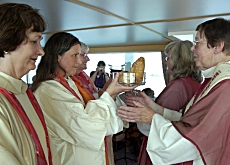Swiss woman ordained Catholic priest

A theologian has become the first Swiss woman to be ordained a Roman Catholic priest, despite Church laws decreeing only men can enter the priesthood.
Monika Wyss, a divorced mother of four, feels she has the right to become a priest even though she will probably be excommunicated.
The ceremony, organised by the West European Roman Catholic Womenpriests organisation, took place on Saturday on board a passenger ship on Lake Constance between Switzerland and Germany.
In addition to Wyss, two other women joined the priesthood: Regina Nicolosi, a German living in the United States, and Jane Via, an American. Another woman from the US, who wishes to remain anonymous, was ordained a deacon, a rank below a priest.
For Wyss, currently a deacon, becoming a priest has been a lifelong ambition.
“It was an idea that came to me at the age of 12,” she told swissinfo. “At the time, my brothers could be Mass servants but I couldn’t, so I played the priest at home and they were my servants.”
Lack of tolerance
Women have been ordained Catholic priests in the past. In 2002, a group of seven women from Germany, Austria and the US entered the priesthood after a ceremony on a Danube cruise ship.
Two male bishops oversaw that ordination. This time it will be three female bishops leading the ceremony.
Rome has not shown any Christian tolerance to women priests. All those who have been ordained – including the three women bishops – have since been excommunicated on the basis that canon law only allows baptised men to enter the priesthood.
These sanctions were overseen by Joseph Ratzinger, the current pope, when he was head of the Congregation for the Doctrine of the Faith, the guardian of Catholic dogma.
Wyss said, however, that without women, the Church would decline. And like many proponents of women in the priesthood, she said her ordination was both normal and not a rebellion against the Church.
“In Christ’s time, women were accepted in the Church,” she added. “It was only when it came under Roman [Empire] influence that they were excluded.”
The women’s bishops have said they do not wish to split the Church and would like to avoid any escalation of the spat with Rome.
There seems little doubt though that the Vatican will issue further excommunications.
Out of touch
When contacted by swissinfo, a spokesman for the Swiss Bishops Conference declined to comment on Saturday’s ordination, although the bishops have stated in the past that there was no way of avoiding the ultimate sanction.
Wyss was not particularly concerned if this were to happen.
“I will still be a Roman Catholic, but I will no longer be accepted by the Church,” she said. “I have no chance of getting a job within the Church with my ideas, so in real terms, it makes no difference for me.”
The theologian said she wanted to carry out normal priestly duties, including celebrating Mass, baptisms, overseeing weddings and, more importantly, to be there for those who need help.
Wyss believed it was natural for women to want to become priests, since society was no longer based on male domination. She added she had received plenty of support ahead of her own ordination.
“Men and women have told me that after 2,000 years it is time for the Church to accept women as humans,” she said.
swissinfo, Scott Capper
The ordination of women has been the subject of regular debate within the Roman Catholic Church.
But in 1994, with the publication Pope John Paul II’s apostolic letter Ordinatio Sacerdotalis, the issue was declared officially closed.
Church teaching affirms that maleness was integral to the personhood of both Jesus and the men he called as apostles.
Canon law states that only a baptised male can be ordained.
However, women’s priesthood has received support in some circles as vocations continue to decline.
Proponents of female priests say that according to literary and epigraphic evidence women were ordained in the West during the fourth and fifth centuries.
In Switzerland, 42 per cent of the population profess to be Roman Catholic.
Most Catholics live in former rural cantons, while Protestants are concentrated in cantons with major urban centres, mirroring the influence of the Reformation.
Switzerland is home to two offshoots of the Catholic Church:
The Old Catholic Church that split from Rome in 1870 after some priests did not accept the dogma of Papal Infallibility.
The Society of Saint Pius X are traditionalists who refuse the teachings of the Second Vatican Council but recognise the pope.

In compliance with the JTI standards
More: SWI swissinfo.ch certified by the Journalism Trust Initiative











You can find an overview of ongoing debates with our journalists here . Please join us!
If you want to start a conversation about a topic raised in this article or want to report factual errors, email us at english@swissinfo.ch.